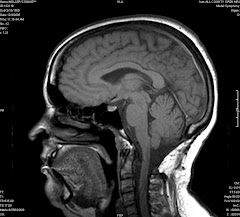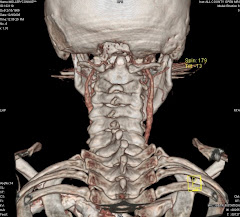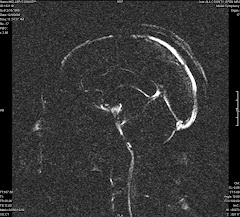Sleep Apnea and why do Chiari patients experience it?
Chiari patients often suffer from Obstructive and Central Nervous Sleep Apnea. Chiari often results in direct compression of the brainstem and can lead to a number of symptoms related to brainstem function of which apnea is one. In addition, Chiari
often puts pressure on the cranial nerves which may result in atrophy of the muscles around the airway. This in turn could lead to an obstruction of the airway during sleep. Also, the presence of a syrinx in the spinal cord may directly interfere with the important nerve signals which travel to and from the brain to monitor and control breathing (www.conquerchiari.org/subs only/Volume 3/Issue 3(6)/Chiari Apnea 3(6).asp).
What is Sleep Apnea?
Sleep Apnea is a serious sleep disorder that occurs when a person's breathing is interrupted during sleep. People with untreated Sleep Apnea stop breathing sometimes hundreds of times. This means the brain --and the rest of the body may not get enough oxygen.
There are 3 types of Sleep Apneas:
1) Obstructive Sleep Apnea (OSA) which is caused by nasal or throat obstruction;
2) Central Sleep Apnea, in which the brain fails to signal the muscles to breathe due to instability in the respiratory control center; or
3) Mixed, which is both and most difficult to treat (many Chiari patients experience because of compression);
The following are youtube videos on Sleep Apnea::
www.youtube.com/watch?v=aNktp0s8rc&feature=related
www.youtube.com/watch?v=wn3kwCwMpU&NR=1
www.webmd.com/sleep-disorders/sleep-apnea/sleep-apnea
The following are written resources on Sleep Apnea:
www.webmd.com/sleep-disorders/sleep-apnea/sleep-apnea
www.mayocilnic.com/health/obstructive-sleep-apnea/MM00715
www.nhlbi.nih.gov/about/ncsdr/index.htm
What to do if you think you have Sleep Apnea?:
1) Consult a Sleep Specialist (Neurologist);
2) Have a Sleep Study done (best if at a sleep center vs. at home);
3) Get a CPAP machine (Continuous Positive Air Pressure);
4) Give yourself months to adjust to using CPAP and try various masks until you find one you like;
5) Give up alcohol as it contributes to apneas;
4) Quit smoking as it contributes to apneas;
5) Avoid Sedatives as it contributes to apneas;
5) Sleep on your side (use pillows to prop your body) - it may help reduce mild apnea;
6) Use Oral Devices such as Zquiet or Breath-Aide to decrease snoring and keep your airways open;
7) Use a Cervical Pillow when you sleep, to help your head stay in a position that reduces apnea;
8) Elevate your upper body when you sleep
Elective Surgery to treat Sleep Apnea includes:
1) Nose Surgery to fix a deviated septum (broken nose) which helps to decrease snoring, decrease sinus
congestion, and improve night-time breathing,
2) Tonsil Surgery to remove the tonsils and improve breathing; or
3) Throat Surgery to remove part of the tissue at the back of the throat to improve breathing;
* surgery can work miracles for some, and do nothing for others
Monday, August 2, 2010
Wednesday, July 7, 2010
Monday, June 21, 2010
Check out New short videos on Ehlers-Danlos Syndrome
Greetings,
Check out two new additions to my short videos.
1) What is Ehlers- Danlos Syndrome? and
2) Ehlers - Danlos Syndrome - Dying to Live.
Check out two new additions to my short videos.
1) What is Ehlers- Danlos Syndrome? and
2) Ehlers - Danlos Syndrome - Dying to Live.
Subscribe to:
Posts (Atom)




